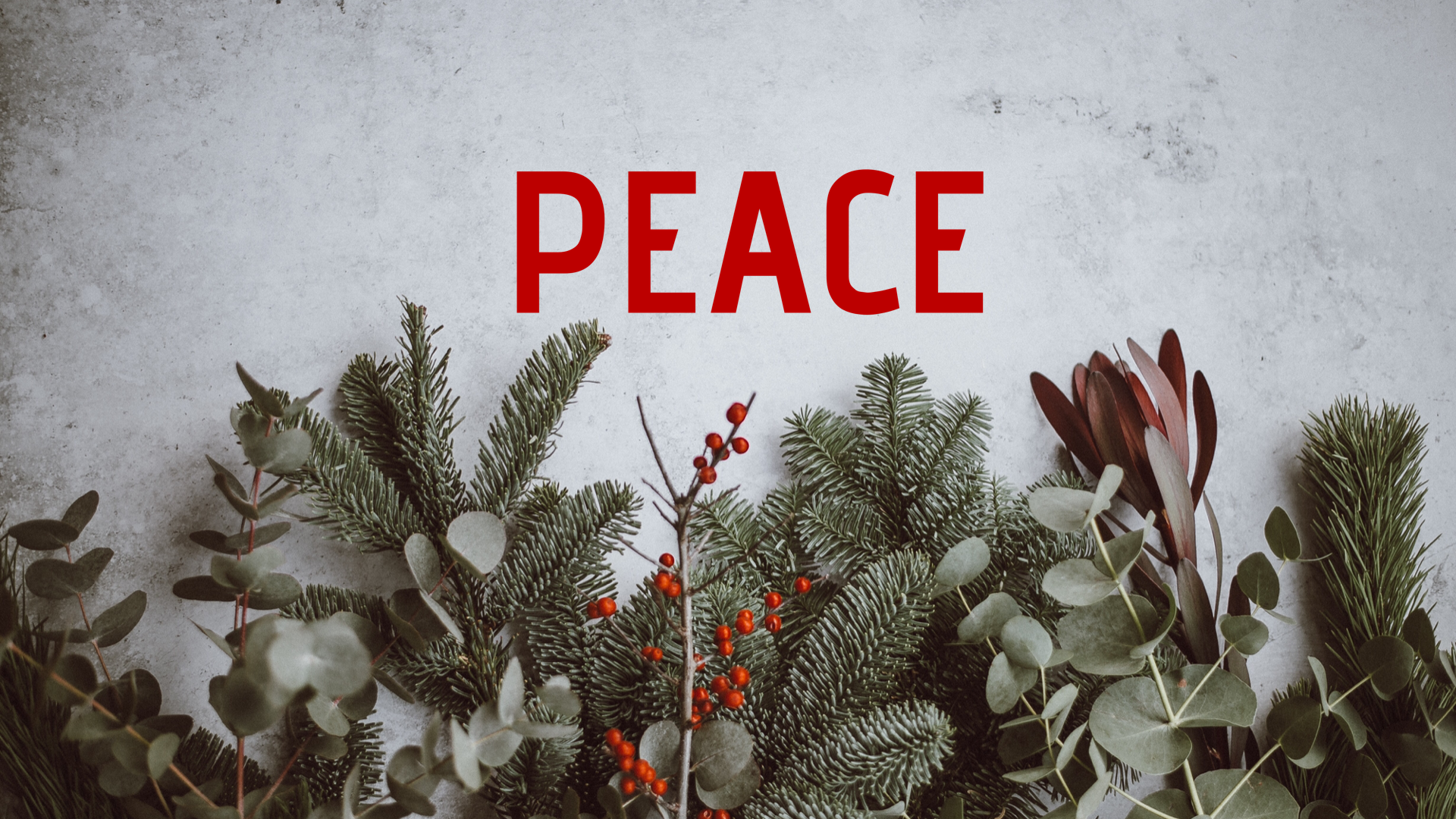Throughout this Advent season, different facets of the nativity story have manifested themselves in traditions or writings or maybe even concrete examples. Candles are lit each week for the correlating theme, and Christians around the world are encouraged to think of these things for they are key to a life of trust in Jesus. In this 4th - but certainly not final - week, there is a culmination of past themes into what is the hope for the future. Not simply that Jesus will return to bring his kingdom to completion, but that he would bring what one has before: peace.
Dear reader of 100 years from now, we live in what has been dubbed a “period of relative peace” in a global geopolitical sense. The great world powers have not squared off since the end of the second world war, and while their has been unease, most see the lack of global annihilation as the result of secular anti-war sentiments pushing for global unity. And while still having a planet that is hospitable is definitely a good thing to wake up to, my generations are hopelessly disillusions in their interpretation of the world. The United States is politically divided, possibly beyond repair in my lifetime, the Middle East is just as unstable as ever, China is pursecuting Muslims by the hundreds of thousands, the Amazon is actually burning, and Europe could be fracturing under nationalistic authoritarianism.
What do we know of peace?
Peace is not a world where no one steps out for fear of being shot.
Peace is a world with no bullets to shoot.
Peace is not tolerating your neighbor.
Peace is loving your neighbor.
Peace is not slashing budgets or regulating morality.
Peace is a community of new hearts.
Peace is not finding one’s true self.
Peace is finding the True One.
We know nothing of peace.
Peace is an interesting term throughout the scriptures. We typically see peace as a period without conflict or a slice of pizza (and yes, I’m talking about p-e-a-c-e). The biblical authors often used peace to refer to a state of completion or wholeness, not lacking any parts in a grand structure or collection. The Hebrew term will probably sound familiar, shalom. The Greek word is just as fun to say, eirene (make sure to have a little roll in the “r”).
In the Old Testament, shalom is thrown around all over the place. Here are some rapid fire examples of its usage, and hopefully, these will illustration a complete (ha ha) picture of the term.
There is no soundness in my flesh because of Your indignation; There is no health (shalom) in my bones because of my sin. - Psalms 38:3
You will know that your tent is secure; you will take stock of your property and find nothing missing (shalom). - Job 5:24
There is a time for everything,
and a season for every activity under the heavens…
...a time to love and a time to hate,
a time for war and a time for peace (shalom). - Ecclesiastes 3:1 & 8
For Israel, peace was not just a state of no conflict. Peace was also the presence of the Lord, and one could say that this was the entire goal of Israel: to be at peace with God. Israel’s sin had made it impossible for God to truly come and dwell among them in a complete sense - thus, the tabernacle and temple which were these places of purity. This isn’t because God has limits, but sin does. In his desire to be with his people, God’s goodness could not allow this sin to be in his presence - which is so good that sin is literally annihilated. Thus, some public health practices were drawn up so that God could come and have peace with Israel.
The New Testament writers picked up on this theme when describing Jesus. It is explicitly part of his arrival in Luke’s gospel:
"Glory to God in the highest heaven, and on earth peace (peace) to those on whom his favor rests." - Luke 2:14
These writers will attribute the peace that was associated with the presence of the Lord and placing it right on Jesus. And Jesus, being the God of Israel, is ready and willing to give this peace out.
Peace (eirene) I leave with you; my peace (eirene) I give you. I do not give to you as the world gives. Do not let your hearts be troubled and do not be afraid. - John 14:27
Paul picks up on this and describes Jesus as the means to having peace with God, but this time, completely (ha ha).
Therefore, since we have been justified through faith, we have peace (eirene) with God through our Lord Jesus Christ, through whom we have gained access by faith into this grace in which we now stand. - Romans 5:1-2
But Paul takes it a step further in his letter to the church in Ephesus:
For he himself is our peace (eirene), who has made the two groups one and has destroyed the barrier, the dividing wall of hostility, by setting aside in his flesh the law with its commands and regulations. His purpose was to create in himself one new humanity out of the two, thus making peace, and in one body to reconcile both of them to God through the cross, by which he put to death their hostility. - Ephesians 2:14-16
For Paul, Jesus wasn’t just a way for a group of people to get to God. Rather, Jesus was also the key for something that had never been done before. Jesus was the cornerstone of a multi-ethnic, multi-generational group of people, committed to one another in love and compassion by one common experience, that of the risen Christ. And the best part is that this group has no limits. Everyone is welcomed. Everyone is loved.
There is neither Jew nor Gentile, neither slave nor free, nor is there male and female, for you are all one in Christ Jesus. - Galatians 3:28
And so the Church continues to celebrate this good news. That even in the midst of chaos in the country and the world, we can have peace. Because true peace is not found in treaties, trade deals, or tolerance but in the Messiah. That savior has come to show us how to be human, and he will come again to bring his kingdom to completion (ha ha). The culmination of our hope, faith, and joy is our peace.
For to us a child is born, to us a son is given, and the government will be on his shoulders. And he will be called Wonderful Counselor, Mighty God, Everlasting Father, Prince of Peace. - Isaiah 9:6


